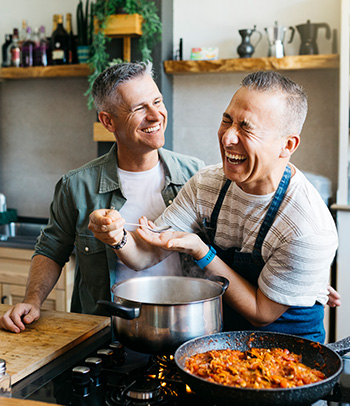Be sure you give your relationship the time and effort it deserves.
A healthy relationship with your partner or spouse can provide you with happiness, comfort and stability. It can decrease your blood pressure, lower your stress levels and reduce your risk for anxiety and depression. Sounds good, right?
But relationships aren’t always perfect. They go through ups and downs, twists and turns. Big life events, financial stress and the demands of parenting can all get in the way of a healthy relationship. Add in some additional challenges Veterans may face, such as frequent separations, reunification after long periods apart and transitioning back into civilian life, and relationships can get even more strained.
A successful relationship takes effort from both people to make it work. Check out the tips and resources below to help you maintain a healthy relationship with your spouse or partner.
Tips for Maintaining a Healthy Relationship
Each relationship is different and will have a unique formula that makes it work, but there are certain ideas, like communicating clearly and putting in effort, that can benefit many relationships. Check out these tips collected from sources such as Military OneSource and the National Institutes of Health:
- Reflect on where your relationship stands. Do you feel connected or distant? What’s working? What isn’t? Once you get a pulse on your relationship, you can begin to look at steps you can take to improve things. Maybe there’s a household chore you could take over that would relieve some stress for your partner. Maybe you could plan a monthly date night if you don’t feel as connected as you once did.
- Communicate clearly. Instead of holding things in and letting them build into resentment or making assumptions and jumping to conclusions, try to do your best to listen to each other and share your feelings openly and honestly. Check out these specific tips to improve your communication.
- Create important rituals or routines. Try a nightly walk around the neighborhood or share a cup of coffee each morning. The more positive interactions you have, the more your relationship can grow.
- Put in some effort. Maybe you’ve been on autopilot for too long and need to step up the romance or your appreciation for one another. Take turns planning date nights or simple surprises to show you care.
- Find the areas causing tension in your relationship. Are your parenting styles at odds? Are your financial goals different from each other? Figure out what’s putting pressure on your relationship and discuss it without blame or anger. Conflicts should not become personal attacks. Instead of “You spend way too much money on clothes,” try “Can we set a budget so that I’m not so stressed about money all the time?” Instead of “You aren’t strict enough on the kids,” try “I think it’s important for our kids to get enough sleep. Can you work with me on a bedtime routine we can both follow?”

- Nurture outside interests and friendships. Your relationship may grow stronger and more interesting when you give each other space. Build other friendships and explore passions of your own, so you’re not expecting one person to fill your entire bucket.
- Get the support you deserve. Some relationship challenges may require outside help, and that’s OK. For example, if you’re struggling with anger or depression and it’s impacting your relationship, you can get treatment to help you and your relationship at the same time. If you’re suffering from post-traumatic stress disorder (PTSD) and find yourself withdrawing from your partner, you deserve support to work through that. Explore the mental health resources offered through the Department of Veterans Affairs (VA), including several different treatment options that may help improve your relationships, such as individual counseling, couples counseling, family therapy, support groups and much more.
Additional Resources
- Strength at Home is a group program for Veterans who struggle with conflict in their relationships. The program teaches conflict management, assertiveness training and communication skills.
- VA’s REACH program provides resources for Veterans and their loved ones to work on relationship challenges, including mobile apps and self-help tools on topics ranging from parenting with PTSD to intimate partner violence.
- VA’s Intimate Partner Violence Assistance Program helps Veterans and their partners who are affected by intimate partner violence. If your relationship is affected by abuse or violence, reach out to the program to get the support you deserve.
- Make the Connection offers stories from other Veterans managing relationships, including this video of spouses, partners and family members discussing the support and resources they used to help strengthen their relationships.
- Healthy Homefront® offers several additional articles related to relationships:
A healthy relationship is a fundamental part of your overall health and wellness. Be sure you give your relationship the time and effort it deserves.







